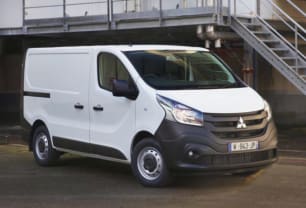With a three-seater cabin as standard, the Express is already at an advantage over a HiAce. You can’t get a three-seat HiAce, and if you’ve got apprentices or workmates that always need a lift - but you don’t want the space sacrifice that comes with a crew van - it could be a crucial decision-maker for you.
And there are decent amenities for the occupants, too, with three cup holders and ample storage options across the dashboard, as well as large bottle holders in the doors. In fact, all told, Mitsubishi claims there is 43 litres of loose item storage in the cabin.
The driver’s seat gets manual height adjustment, lumbar adjustment and an armrest, as well as steering wheel rake and reach adjustment, so getting a comfortable driving position should be a cinch. Unlike the Trafic, there’s no driver’s seat heating option, but the clever “Load Through” cavity - for loading items up to 4.14m long - under the passenger seat is fitted on all models (but unlike the Trafic, which has a bulkhead, there’s no porthole, and the vehicles we tested with cargo cages didn’t have an opening to make the best use of this).
It’s set up for hard work, with rubber floor mats and a “hard wearing” poly trim on the steering wheel, though that finish is a bit coarse, and not as pleasant to hold as a leather wheel. The seat trim is fabric, and feels to be made of a durable material.
Ergonomically, it is no different to a Renault Trafic. Most important controls fall easily to hand, though people unfamiliar with Renault switchgear may need to pay attention at the dealership when the positioning of the cruise control and speed limiter buttons are explained. The buttons are between the dashboard and steering wheel.
And if you’re looking for the volume button, it’s on the weird little stalk behind the wheel itself. That has tuning and phone controls too, and it takes some getting used to. Further, if you’re used to the blinkers being on the “right” side of the steering wheel in Japanese cars, the Express is the exception.
When it comes to media and infotainment, there’s a lot left to be desired. There is no touch screen at all, and you can’t option one, either. Some drivers will appreciate that, but others will lament the lack of smartphone mirroring tech (Apple CarPlay and Android Auto), and likewise there is no sat nav available, either. There’s not even a CD player, but as standard the Express gets a smartphone holster with USB port on top of the dash, so there are two USB ports to keep things charged, plus a 12-volt below if you need it.
But the simple media system does offer a USB port to connect your phone or MP3 player, and Bluetooth phone and audio streaming, as well as DAB digital and AM/FM radio. The sound system has just two speakers, but it’s okay.
The cargo zone is, as you’d expect, a big, largely empty space. There’s no steel bulkhead option to separate the two zones, which could be frustrating for some customers - though if you can deal with the noise reverberation but just want to make sure things don’t fly from front to rear, there is a mesh cargo barrier available.
There are 14 tie-down points in the SWB (eight floor mount, six wall mount) and 16 tie eyelets in the LWB (10 floor, six wall). Plus there’s a rear-mount 12-volt outlet near the back doors to keep things charged.


































